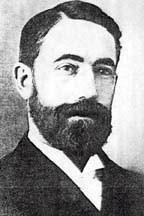1853 - 1923 Person Name: A. P. Cobb Hymnal Number: 116 Author of "When the Harvest Is Past" in Grateful Praise Born: October 27, 1853, Wooster, Ohio.
Died: February 11, 1923.
Buried: Fairlawn Cemetery, Decatur, Illinois.
Cobb’s family moved to Decatur, Illinois, when he was about 13 years old. As a young man, he worked as a machinist. He graduated from Eureka College, Eureka, Illinois, in 1878, and pastored in Normal, Washburn, Petersburg and Springfield, Illinois; Des Moines, Iowa; Covington, Kentucky; and San Antonio, Texas. He was also an active evangelist, attending meetings in Boston, New York City, Minneapolis, and other major cities.
--www.hymntime.com/tch/
Abner P. Cobb



